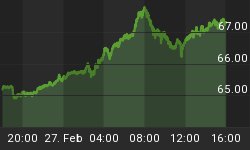The Consumer Metrics Institute is out with commentary on the latest GDP revision. Here's an excerpt:
As we noted last month, on the surface a 2.38% annualized growth rate at nearly full four years into a recovery is good news -- and a growth rate that many other global economies would currently be pleased to be reporting. And looking at the details provides us with some reasons for optimism:
- Consumer spending was sustained in spite of tax increases,
- Fixed investments continued to grow (although at a slower pace than in the prior quarter),
- Exports were still growing (slightly) after the prior quarter's of contraction.
But one overriding issue in the data continues to suggest a reason for caution:
- Real per capita disposable incomes took a major hit, and it would appear that consumers had to dip into savings to sustain spending levels in the face of the January increase in FICA taxes. The astonishing annualized contraction of real per capita disposable income bears repeating: -9.03% -- a full percent and a half worse than the -7.52% contraction rate recorded in the first quarter of 2009 (the worst quarterly contraction recorded during the official duration of the "Great Recession").
The contraction in real per capita disposable income caused the savings rate to plunge to 2.3%. This is the lowest savings rate since the 3rd quarter of 2007. Which begs the question: is it 2007 once again and consumers are leveraging up once more in joyous optimism (as the equity markets seem to assume)? Or, are households dipping into savings (and defacto leveraging up) out of necessity to offset the "new" FICA rate increase of 2% (by reducing their savings rate by -2.4% relative to 4Q-2012)?
Our view is that the household savings rate is a short term shock absorber for household budgets that can require a quarter or more to adjust to the realities of new taxes or falling incomes. Ultimately, however, households adjust to the new realities by tightening their spending. In this case we would be shocked if spending does not soften during the balance on 2013.
Some thoughts
The key word in the above analysis is "leverage." With per capita income falling, the only way the economy can grow is if we save less and borrow more. This is clearly happening. But with the savings rate down and taxes and interest rates up, as CMI says, "we would be shocked if spending does not soften during the balance on 2013."
Talk about mixed messages. Stocks are at record levels and housing is booming, which implies a 2007-style bubble. But incomes are falling at a near-double-digit rate which implies a fairly serious slowdown. So which will it be: blow-off asset bubble or a double-dip recession?
Who knows? But note how extreme both scenarios have become. Stocks in general and home prices in many markets are literally back to 2007 bubble levels. The savings rate is as low as it was in 2007 and total debt is rising again, as mortgages and business loans more than offset a smaller federal deficit. So sustained growth from here would mean an even bigger asset bubble than the one that nearly destroyed the global financial system, while a return to recession would mean plunging stock and home prices.
This might be a good time to forget about direction and just bet on volatility.















